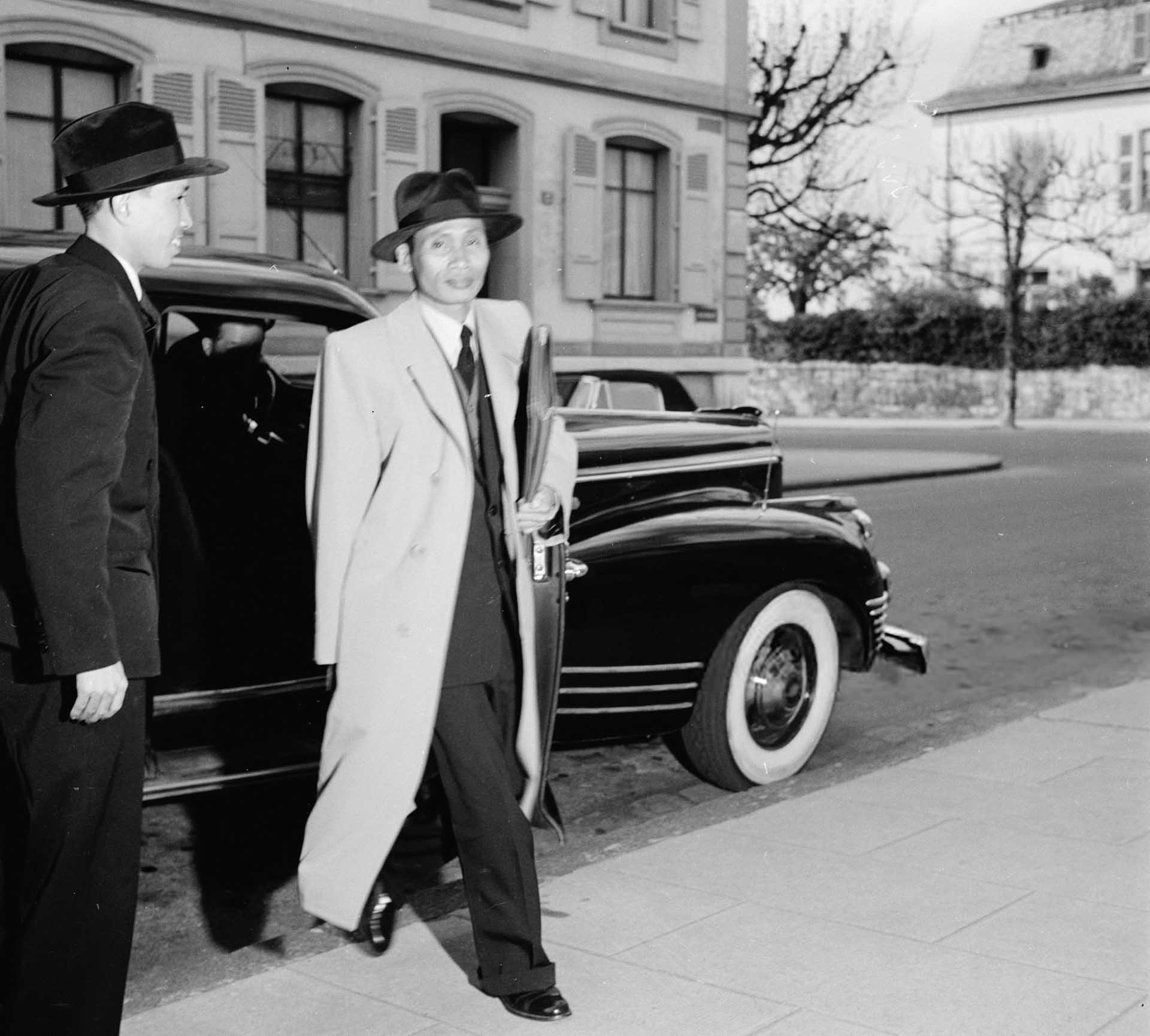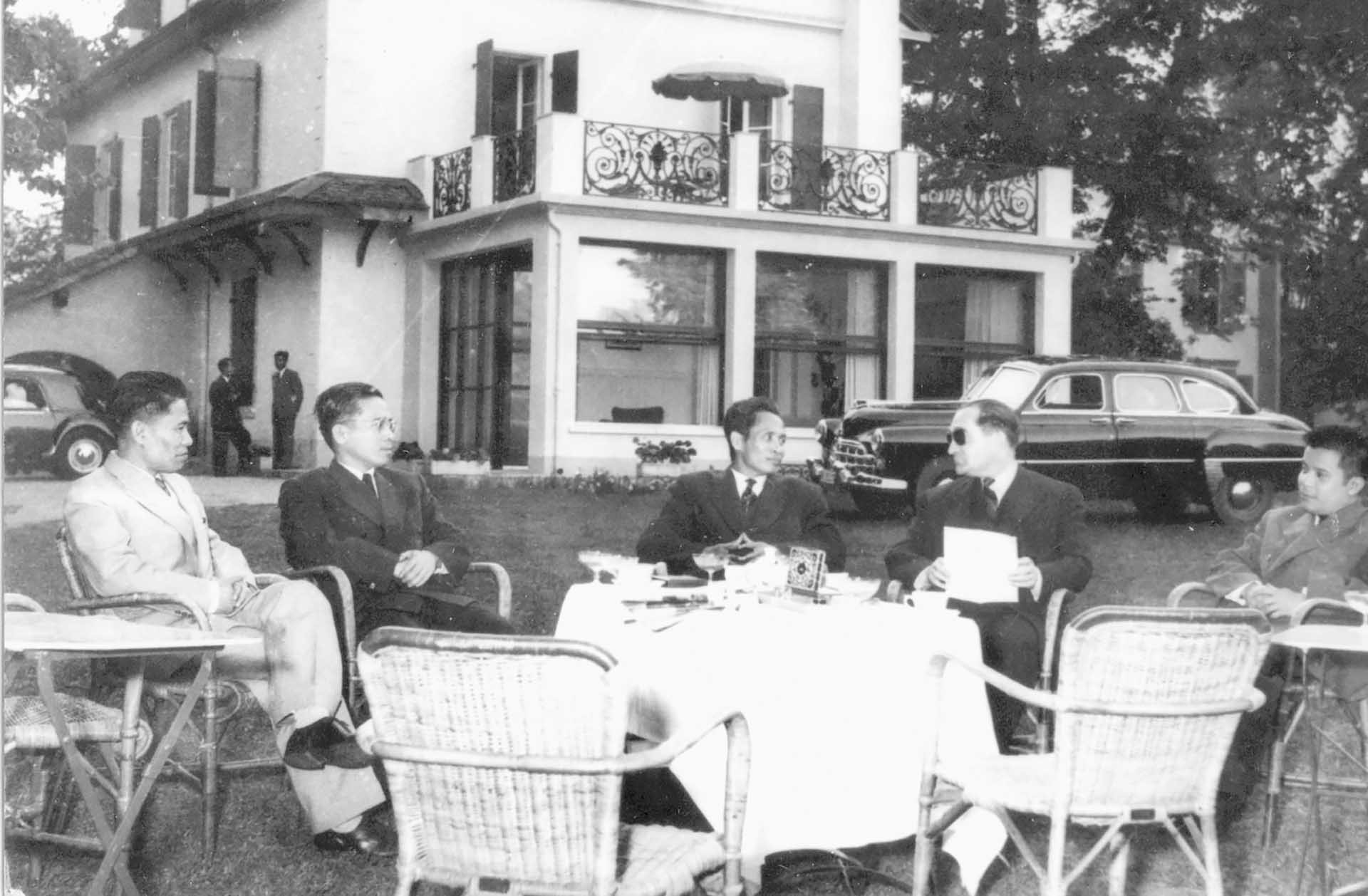
Pham Van Dong and the pride of Vietnamese Diplomacy
Latest
 |
| Deputy Prime Minister Pham Van Dong arrives at the Geneva Conference. (Source: Getty images) |
There were nine parties attended at the Conference (it was co-chaired by the Heads of delegation from the Soviet Union and the UK). At the time, as Deputy Prime Minister, Pham Van Dong was appointed as the Head of the delegation representing the Government of the Democratic Republic of Vietnam to attend the Geneva Conference on the restoration of peace in Indochina and Vietnam.
In face of difficulties
The Vietnamese delegation entered the conference with the stance of a victorious nation. However, due to significant differences in positions among the delegations, the negotiations progressed slowly.
On the one hand, Pham Van Dong, representing the delegation of the Democratic Republic of Vietnam, steadfastly advocated for an end to the war and the establishment of peace in Indochina based on the recognition of the independence, unity, and territorial integrity of Vietnam, Laos and Cambodia. He persistently fought to isolate the pro-war faction within France and oppose American intervention. This stance compelled the French people to realize that the bellicose government under Prime Minister Laniel needed to change for the Geneva Conference to yield results.
On the other hand, the Democratic Republic of Vietnam’s Head of delegation Pham Van Dong, exposed the belligerent stance of the delegations from the West. Accordingly, the US delegation aimed to prolong and expand the war in Indochina, stepping into the shoes of France in invading Indochina. The British delegation advocated for supporting France to negotiate from a position of strength. The French pro-war faction accepted to negotiate with Vietnam to avoid public outcry and prevent being overthrown by the French people, as well as to save the French army in Indochina.
| According to Mr. Tran Viet Phuong, former Private Secretary of Prime Minister Pham Van Dong, during his lifetime, Mr. Pham Van Dong always put national interests first, knowing how to combine national interests with ideological requirements. He often referred to a quote by Jean Jaurès, the famous French socialist leader: “A little patriotism takes us away from internationalism, but a lot of patriotism takes us into the center heart of internationalism.” (Pham Van Dong and Vietnamese Diplomacy, National Political Publishing House 2006, pages 108,109) |
However, Pham Van Dong thoroughly won the broad consensus and support both inside and outside the Conference, especially winning the support of the Head of the Soviet delegation, Vyacheslav Molotov, and the Head of the Chinese delegation, Zhou Enlai, who strongly condemned the bellicose attitude and the sabotage of the Conference by the French and American delegations.
As a result, due to the French delegation’s insistence on maintaining a hardline stance, Prime Minister Laniel’s Cabinet faced condemnation from the French people, leading to his resignation on June 12, 1954. The pro-war faction in France was overthrown, and Mendès France of the peace faction formed a new government. On June 18, 1954, upon taking office, Mendès France declared that he would resign if a ceasefire in Indochina was not achieved within a month. Meanwhile, in Saigon, the United States installed Ngo Dinh Diem as Prime Minister, replacing Buu Loc under the reign of Bao Dai.
Cleverness and determination
In the Conference, the most challenging issue was the demarcation line and the timeline for a general election in Vietnam.
Pursuing the directives of the Party and President Ho Chi Minh, Pham Van Dong persistently proposed using the 16th parallel as the temporary demarcation line and conducting early general elections. However, the French disagreed and still proposed using the 18th parallel as the demarcation line. In the end, with cleverness and determination, at the negotiation on the night of July 20, 1954, Pham Van Dong and Heads of delegations of the UK, France, the Soviet Union, and China reached a last-minute agreement to use the 17th parallel as the demarcation line between North and South Vietnam and set the timeline for general elections at two years.
On May 10, 1954, the famous 8-point proposal by Pham Van Dong was introduced and became the basis for discussion at the conference, as it had a significant impact on the people of colonial countries and imperialist countries, especially on the people and government of France.
In it, Pham Van Dong emphasized Vietnam’s fundamental principles of peace, independence, unity, democracy, and territorial integrity. France must recognize the independence and sovereignty of Vietnam, Laos, and Cambodia. The issue of Vietnam’s reunification must be resolved by the Vietnamese people themselves without foreign intervention... The reasonable and fair proposals put forward by Pham Van Dong garnered support of progressive public opinion in France and the world.
 |
| French Prime Minister Pierre Mendès France met with Deputy Prime Minister Pham Van Dong. (Source: VNA) |
“A great victory”
The success of the Geneva Conference was a tremendous victory for the Vietnamese people. President Ho Chi Minh remarked, “The Geneva Conference has concluded. Our diplomacy has achieved a great victory”.
The global situation and international relations were extremely complex during the Geneva Conference. The Vietnamese negotiating delegation, led by Pham Van Dong, faced countless difficulties, shortages, and a lack of information. Yet they took proactive and positive steps to overcome these challenges, making significant contributions and persistently seeking measures to safeguard the interests of the nation, the Indochinese revolution, and the two resistance governments of Pathet Lao and Khmer Issarak.
The contributions of Pham Van Dong and the Vietnamese delegation led to breakthroughs that brought the Geneva Conference to success, resulting in the signing of ceasefire agreements in Indochina. The image of the diplomat Pham Van Dong with his bright eyes, high forehead, and especially his resolute speeches, and sharp responses during interviews at the Geneva Conference continues to be remembered by international friends. It is a source of pride and a shining example not only for the Vietnamese diplomacy but also for the entire Vietnamese nation.
The success of the 1954 Geneva Conference was embraced by peace-loving people worldwide, especially those in Southeast Asia countries, who warmly welcomed it and regarded it as their own victory. With this triumph, progressive and peace-loving people around the world became aware of Vietnam, trusting in its peaceful and friendly diplomatic policies. They viewed it as a splendid success of the approach of using peaceful negotiations to resolve international disputes, even the most serious conflicts.
| Pham Van Dong (March 1, 1906 - April 29, 2000), nicknamed To, was born in a family of civil servants in Duc Tan commune, Mo Duc district, Quang Ngai province. He served as a member of the Party Central Committee for 41 years, as a Politburo member for 35 years, as Prime Minister for 32 years, and 10 years as Advisor to the Party Central Committee. He was considered “an outstanding and close disciple of President Ho Chi Minh”, “an excellent political and cultural theorist” and “a talented diplomat with international prestige.” (Eulogy of the Party Central Committee read at the funeral of Comrade Pham Van Dong on May 6, 2000). |













